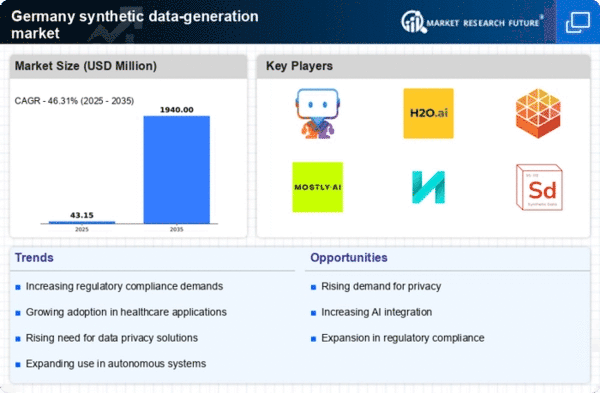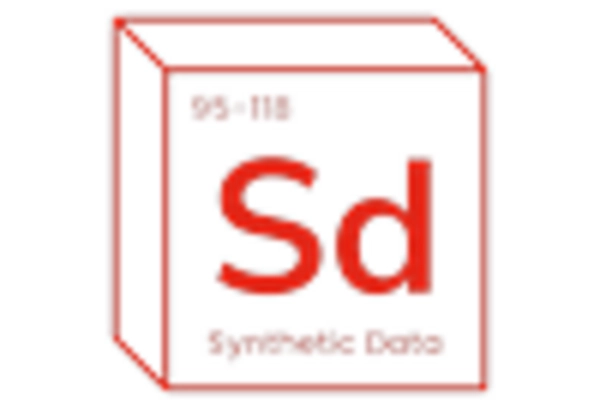Emergence of Advanced Analytics
The rise of advanced analytics tools is significantly influencing the synthetic data-generation market in Germany. As organizations seek to derive actionable insights from vast amounts of data, the need for high-quality synthetic datasets becomes paramount. These datasets facilitate the training of machine learning models without exposing real user data, thus ensuring compliance with data protection laws. The market is expected to witness a growth rate of around 20% as businesses increasingly adopt synthetic data solutions to enhance their analytical capabilities. The synthetic data-generation market is becoming integral to the analytics landscape, providing a means to overcome data scarcity and privacy challenges while enabling organizations to harness the full potential of their data.
Increased Need for Data Security
The synthetic data-generation market in Germany is experiencing a notable surge in demand due to heightened concerns regarding data security. Organizations are increasingly recognizing the importance of safeguarding sensitive information, particularly in sectors such as finance and healthcare. As a result, the market is projected to grow at a compound annual growth rate (CAGR) of approximately 25% over the next five years. This growth is driven by the necessity to create realistic datasets that do not compromise personal data, thereby allowing companies to innovate while adhering to stringent data protection regulations. The synthetic data-generation market is thus positioned to play a crucial role in enabling businesses to maintain compliance while leveraging data for analytics and machine learning applications.
Growing Adoption of AI Technologies
The synthetic data-generation market in Germany is being propelled by the growing adoption of artificial intelligence (AI) technologies across various industries. As companies integrate AI into their operations, the demand for diverse and extensive datasets to train these systems is escalating. Synthetic data serves as a viable solution, offering a way to generate large volumes of data that mimic real-world scenarios without the associated privacy risks. This trend is expected to contribute to a market growth of approximately 30% in the coming years. The synthetic data-generation market is thus becoming a vital component in the AI ecosystem, enabling organizations to develop robust AI models while ensuring compliance with data regulations.
Regulatory Compliance and Standards
The synthetic data-generation market in Germany is significantly influenced by the evolving landscape of regulatory compliance and standards. With stringent data protection laws such as the General Data Protection Regulation (GDPR) in place, organizations are compelled to seek solutions that allow them to utilize data without infringing on privacy rights. Synthetic data provides a compliant alternative, enabling businesses to conduct research and development without the risk of data breaches. The market is anticipated to grow by approximately 22% as companies prioritize compliance in their data strategies. The synthetic data-generation market is thus positioned as a key player in helping organizations navigate the complexities of data regulations while fostering innovation.
Investment in Research and Development
Investment in research and development (R&D) is a critical driver for the synthetic data-generation market in Germany. As companies strive to innovate and improve their products and services, the need for high-quality synthetic datasets becomes increasingly apparent. R&D initiatives focused on enhancing synthetic data generation techniques are expected to lead to advancements in the quality and applicability of synthetic datasets. This focus on innovation is likely to result in a market growth rate of around 18% over the next few years. The synthetic data-generation market is thus becoming a focal point for organizations aiming to leverage cutting-edge technologies while ensuring data privacy and security.
















